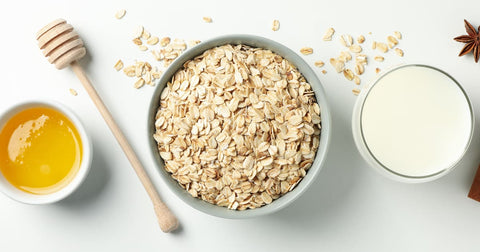Have you ever experienced a symphony of gurgling, rumbling, and popping sounds emanating from your abdomen? This sensation, affectionately known as "bubble gut," has a more technical name: borborygmi (pronounced bor-bor-IG-mee). While it might be embarrassing or even painful at times, it's actually a common occurrence. Let's delve into what causes bubble guts, explore potential triggers, and discover how to silence the symphony.
What is Borborygmi (Bubble Guts)?

- The Audible Gut: Borborygmi is the medical term for the rumbling and gurgling sounds your intestines make as they contract and move food, liquids, and gas through your digestive system.
- It's Normal (to a Point): These noises are a natural part of digestion, but they can become excessive or unusually loud in some situations.
- Causes Vary: From harmless triggers like hunger to underlying conditions, it's important to understand what might be causing your bubble guts.
Why Am I So Gurgly? The Culprits Behind Bubble Guts
1. Air and Gas:
- The Usual Suspects: Swallowing air while eating or drinking, carbonated beverages, gas-producing foods (beans, cruciferous vegetables, etc.), and even stress can lead to excess gas in your intestines, resulting in those telltale sounds.
- The Gut Microbiome: Imbalances in your gut bacteria can also contribute to increased gas production.
2. Digestive Motility:

- Smooth Muscle Contractions: Your intestines use wave-like contractions (peristalsis) to move food along. Sometimes, these contractions are stronger or more frequent, leading to louder gurgling.
- Diarrhea or Constipation: Changes in bowel habits can alter motility, leading to increased or decreased gut noises.
3. Hunger:
- The Empty Stomach Symphony: When your stomach is empty, contractions that signal hunger pangs can be quite audible.
- The Hormone Connection: The hormone ghrelin, which stimulates appetite, also plays a role in gut motility and can contribute to gurgling.
What is Excessive Gas a Sign Of?
While occasional borborygmi is normal, excessive or persistent gurgling accompanied by other symptoms might warrant further investigation:
- Food Intolerances: Sensitivities to certain foods, such as lactose or fructose, can trigger gas, bloating, and diarrhea.
- Irritable Bowel Syndrome (IBS): This common condition often involves abdominal pain, bloating, and changes in bowel habits, often accompanied by increased gut noises.
- Inflammatory Bowel Disease (IBD): Conditions like Crohn's disease and ulcerative colitis can cause inflammation and changes in gut motility, leading to frequent and sometimes painful borborygmi.
How to Release Gas from Stomach & Relieve Trapped Gas

- Move Your Body: Gentle exercise like walking or yoga can help stimulate digestion and move gas through your system.
- Warm Compress: Applying a warm compress to your abdomen can relax muscles and ease discomfort.
- Herbal Teas: Peppermint, ginger, and chamomile tea are known to soothe digestion and reduce gas.
- Over-the-Counter Remedies: Simethicone (Gas-X) helps break up gas bubbles, while activated charcoal can help absorb excess gas.
Food Intolerance Testing: Uncover Hidden Triggers
If your bubble guts are frequent or accompanied by other digestive symptoms, consider a food intolerance test. It can help identify specific foods that might be triggering your discomfort, allowing you to make targeted dietary changes for relief.
The Takeaway
While borborygmi, or "bubble guts," can be embarrassing, they're usually a harmless part of the digestive process. However, if the noises are excessive, persistent, or accompanied by other symptoms, it's worth seeking medical advice to rule out underlying conditions. By understanding the causes and exploring solutions like dietary modifications and food intolerance testing, you can quiet those rumbles and enjoy a happier, healthier gut.
Frequently Asked Questions:
1. My stomach always seems to make loud noises. Is this normal?
It depends on the frequency and intensity. Occasional gurgling is a natural part of digestion. However, if it's excessively loud, frequent, or accompanied by discomfort, it could indicate an underlying issue like a food intolerance or irritable bowel syndrome (IBS).
2. What foods should I avoid to reduce the gurgling and rumbling in my stomach?
Common gas-producing foods include beans, cruciferous vegetables (broccoli, cauliflower, cabbage), carbonated drinks, artificial sweeteners, and fatty or fried foods. However, everyone's triggers are different, so a food diary can help pinpoint your specific culprits.
3. Can stress make my stomach gurgling worse?
Yes! Stress can disrupt your digestion and lead to increased gas production and motility, resulting in louder and more frequent noises. Finding ways to manage stress, like meditation or yoga, might help.
4. I'm embarrassed by my stomach sounds. Can anything be done about it?
While you can't completely silence your gut, you can try to reduce the loudness and frequency of the noises. Avoid eating or drinking too quickly, chew your food thoroughly, and address any underlying digestive issues like food intolerances.
5. Is it dangerous if my stomach makes gurgling noises even when I haven't eaten?
Usually not. Hunger can cause your stomach to make noises as it contracts to signal it's empty. However, if it's accompanied by pain or other symptoms, consult a doctor to rule out any other underlying conditions.


.png?v=1737390083)
.png?v=1737187409)


